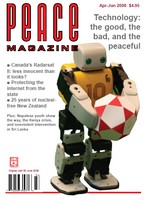
Peace Magazine Apr-Jun 2008, page 11. Some rights reserved.
Search for other articles by James Applegate here
Till the war-drum throbb'd no longer, and the battle-flags were furl'dIn the Parliament of man, the Federation of the world.Alfred Lord Tennyson, "Locksley Hall," 1842
If you could make the UN more democratic by clicking on your computer mouse, would you do so? Former U.N Secretary-General Boutros Boutros-Ghali is asking people around the world to do just that.
Boutros-Ghali and others wants ordinary citizens, MPs, and organizations to endorse the Campaign for a UN Parliamentary Assembly.
"A Parliamentary Assembly would make the UN more transparent, efficient, and more democratic," states the former Secretary-General.
Supporters of the Campaign argue that the world system suffers from a deep "democratic deficit," since national governments simply appoint UN delegates. Instead, voters should elect representatives for that global body.
As of March 2008, campaign supporters number citizens from 114 countries, notably 479 MPs and numerous other prominent people. In Britain, for example, endorsers include former Secretary of State Clare Short, writer Sir Arthur C. Clarke, and actor Emma Thompson.
While previous UN reforms have failed, current campaigners propose that the General Assembly could create the Parliamentary Assembly as a "semi-autonomous secondary body" by using Article 22 of the UN Charter. At first, representatives could come from MPs already elected to national parliaments. Later, citizens would vote directly for representatives in a global assembly with roughly 700-900 seats.
In Canada, the World Federalists are promoting the non-partisan campaign, getting support from current or former MPs from all major political parties. Significantly, Canada's multi-party Standing Committee on External Affairs endorsed the assembly in June 2007, reaffirming approval it gave when the concept was first discussed in 1993.
Worldwide, the campaign is coordinated by the Committee for a Democratic UN in Germany. Chaired by business consultant Andreas Bummel, the steering committee is seeking endorsements not only from individuals, but also from NGOs and existing parliaments.
The European Parliament endorsed the idea in 1993, then again in 2003 and 2005. The Pan-African Parliament affirmed its support in October 2007.
The gradual evolution of the European Parliament provides a model for a UN Parliamentary Assembly. The now powerful Europarl had its modest beginnings in 1952, starting out as a consultative body, the European Steel and Coal Community. Similarly, a UN Parliamentary Assembly could start in a consultative role, gaining power after proving its integrity and usefulness.
Boutros-Ghali and others argue that the Parliamentary Assembly is badly needed to deal with globalized economic and political systems.
"We need to promote the democratization of globalization, before globalization destroys the foundations of national and international democracy," Boutros-Ghali says. Ultimately, the Assembly could oversee the World Bank, the IMF and the WTO.
Critics argue that the UN lags behind other international bodies with parliamentary dimensions, such as NATO and the OSCE.
While the concept of a world parliament dates back to the 1800s, modern writers sparked renewed enthusiasm in the 1990s. In 1992 for example, Dieter Heinrich, then president of the World Federalists of Canada, wrote an influential paper titled "The Case for a United Nations Parliamentary Assembly."
Of course, the campaign has opponents. In the US, these include unilateralist Republicans like former UN Ambassador John Bolton and Congressman Ron Paul, who oppose any expansion of UN powers; meanwhile, Jeffrey Laurenti of the American United Nations Association argues that the idea is premature.
Before the Assembly is born, proponents will need to solve practical problems. For example, how many representatives will each country send? This problem is common in federal systems balancing greater and smaller powers; political scientists offer solutions based on factors such as population, economic power, and human rights records.
Military historian Gwynne Dyer argues that the Parliamentary Assembly could improve the current world system; unfortunately, he believes its evolution could take 20 to 50 years.
Whatever hurdles it faces, the Campaign aims to make the UN more responsive and accountable, while fostering a truly global democratic consciousness.
Above all, advocates like Boutros-Ghali want citizens to get involved and endorse the Campaign, first by clicking the mouse as they visit the website of the Campaign for a UN Parliamentary Assembly (www.unpacampaign.org).
James Applegate is a Vancouver writer specializing in war and peace.

Peace Magazine Apr-Jun 2008, page 11. Some rights reserved.
Search for other articles by James Applegate here